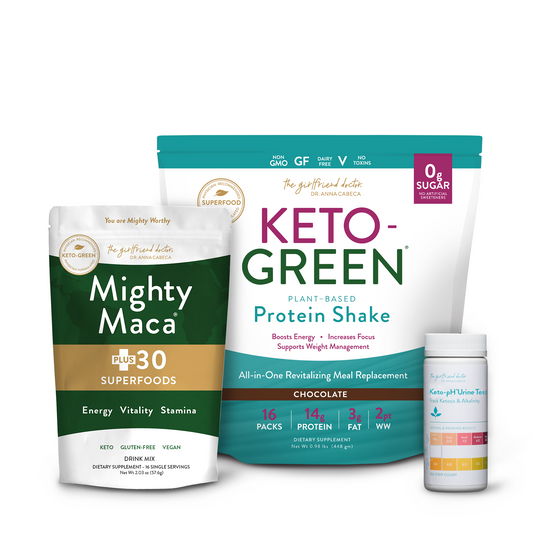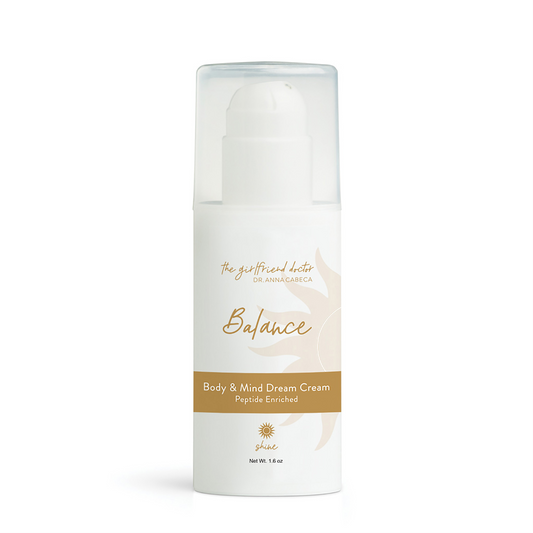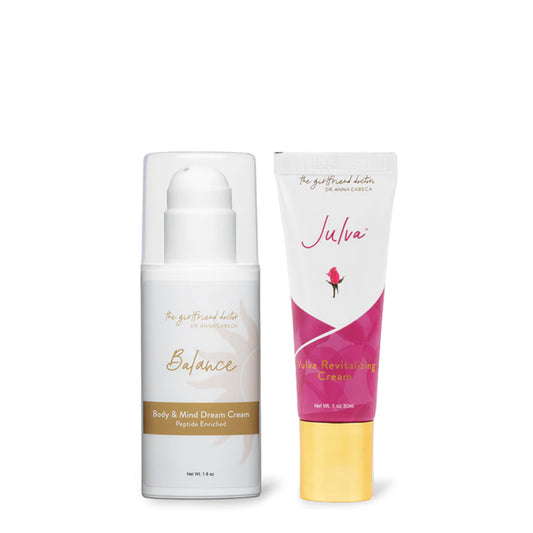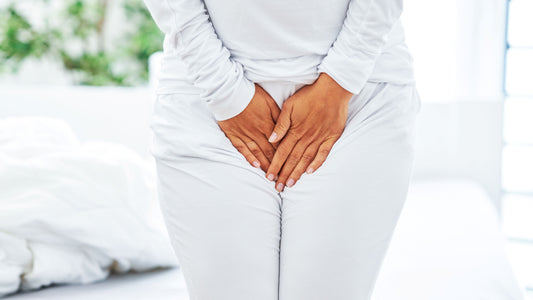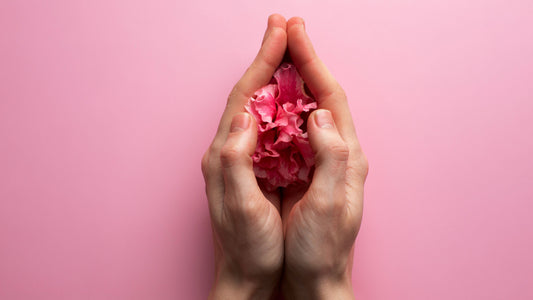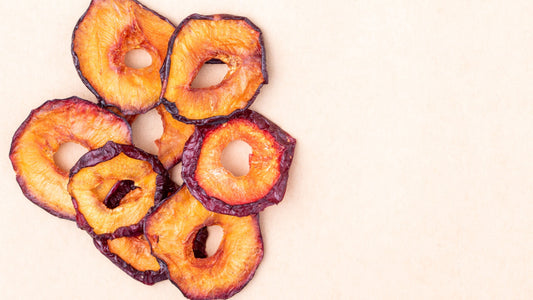In This Article, You’ll Learn
- What vaginal aging really is (and why it’s normal)
- Common signs of change after 40
What actually causes dryness and skin changes
Simple, gentle ways to support comfort and confidence
How to care for intimate skin daily (cosmetic, appearance-focused)
Quick answers to your most-asked questions
A Note From Your Girlfriend Doctor
Girlfriend, yes—vaginal aging is real. And yes—it’s normal. But “normal” doesn’t mean you have to live with discomfort, dryness, or a sense of disconnection from your body. I’m Dr. Anna Cabeca, a triple‑board‑certified OB‑GYN and your Girlfriend Doctor. I went through my own hormone crash in my late 30s, and even with all my training, I wasn’t prepared for how it could feel “down there.”
What I learned—through my practice, research, and personal journey—is that with the right knowledge and gentle support, you can feel comfortable, confident, and connected at every age.

Vaginal aging refers to the natural, time‑related changes in the vulvar and vaginal area—especially in moisture, elasticity, and skin feel. These changes often begin in perimenopause and can be more noticeable after menopause as hormone patterns evolve (including estrogen and DHEA).
Here’s the nuance most of us were never taught:
It’s not only about hormones.
Lifestyle, stress, nutrition, medications, and product choices (like fragranced washes) can influence how intimate skin feels.
Just like facial skin, intimate skin can become drier and thinner with time—this is a whole‑body phenomenon, not a personal failing.
You are not broken. Your body is evolving and asking for new care.
Common Signs of Vaginal Aging After 40
Every woman is different, but these are commonly reported shifts:
External dryness or irritation on the vulva
Skin that feels thinner or less elastic
Sensitivity or discomfort during intimacy
Changes in sensation or confidence
Post‑activity discomfort after sitting, exercise, or intercourse
If any of this resonates, you’re not alone—and there are gentle options that can help you feel more at home in your body again.
What Causes Vaginal Dryness and Skin Changes?
Aging skin everywhere—including intimate skin—tends to produce less of what keeps it soft and comfortable:
Fewer natural oils and less hyaluronic acid
Changes in collagen and elasticity
Shifts in circulation and hydration
Hormone pattern changes through peri‑ and post‑menopause
Lifestyle contributors matter, too:
Stress and sleep debt (they influence your nervous system and recovery)
Diets low in minerals, hydration, and essential fats
Harsh soaps, fragrances, and tight, synthetic fabrics
Certain medications and product sensitivities
When we address both biology and lifestyle, comfort and confidence are much easier to reclaim.

Think “simple, consistent, and soothing.” These strategies are cosmetic and lifestyle‑focused.

Consider a feminine cosmetic cream formulated for external, intimate skin comfort and hydration.
Options include hormone‑free cosmetic moisturizers and cosmetic formulas that include DHEA for cosmetic use, designed to support the appearance and feel of hydrated, comfortable skin.
Use as directed; patch test first if you have sensitive skin.
Note: Topicals discussed here are cosmetics intended to improve the appearance and feel of skin.

Focus on greens, colorful vegetables, clean proteins, and healthy fats (avocado, olive oil, flax, chia).
Hydrate well; consider adding electrolytes or a pinch of mineral‑rich salt to water.

Swap fragranced washes for gentle, pH‑balanced cleansers.
Choose breathable fabrics (organic cotton) and avoid tight, synthetic underwear for everyday wear.

Daily movement boosts circulation; slow nasal breathing lowers stress reactivity.
Both support your body’s natural ability to feel supple and calm.

Start with a hormone‑free cosmetic moisturizer for intimate skin comfort.
If you’re curious about a cosmetic formula that includes DHEA for cosmetic use, read labels carefully and consult your provider with any questions.
My Story—and Why I Formulate the Way I Do
When my hormones crashed in my late 30s, I experienced dryness and disconnection that surprised me—even as a seasoned OB‑GYN. I dove into research and integrative medicine, traveled, learned, and tested. That journey shaped my philosophy: clean, transparent, cosmetic formulations that focus on hydration, comfort, and the appearance of healthy skin—along with lifestyle upgrades that actually feel doable.
Your comfort matters. Your confidence matters. And the path forward can be gentle.
How to Start Gently (Patch Test + Routine Tips)
If you have a sensitive system, a little planning creates a lot of ease.
Patch Test (Topicals)
- Clean a small area on your inner forearm.
Apply a pea‑sized amount and allow to absorb.
Wait 24–48 hours and observe.
If skin looks and feels normal, begin directed use.
Build a Simple Daily Rhythm
A.m.: Hydrate (add minerals), brief movement, balanced breakfast (protein + plants).
Midday: Walk 10 minutes after a meal to support circulation.
P.m.: Screen‑free wind‑down, warm bath, gentle moisturizing routine (face, body, and intimate skin as desired).
Consistency > intensity. Small, kind steps add up.

Intimacy can evolve after 40—and that can be beautiful. Many women report:
Deeper connection with more communication and intention
A need for more external hydration and comfort (cosmetic moisturizers can help)
An appreciation for oxytocin rituals: cuddling, eye contact, shared laughter, slow dancing
Pleasure isn’t only about hormones. Safety, trust, self‑acceptance, and playfulness are powerful allies.
Can a Cosmetic Feminine Cream Really Help?
Many women share that adding a daily moisturizing routine for intimate skin helps them feel more comfortable and confident, especially when paired with hydration, nutrition, and stress‑lowering habits.
What to look for:
Clearly labeled for external, cosmetic use
Transparent ingredient list
Gentle, nourishing oils and cosmetic actives
Fragrance‑free or lightly scented (if you’re sensitive, go fragrance‑free)
Reminder: Cosmetic products are intended to improve the appearance and feel of skin and are not intended to treat medical conditions.

Safety & Sensitivity Notes
- Topical products discussed are cosmetics for external use only, intended to improve the appearance and feel of skin.
If using a cosmetic formula that includes DHEA for cosmetic use, read labels carefully, use as directed, and consult your provider with questions.
Avoid if you are on tamoxifen. Consult your provider if you are pregnant, breastfeeding, have hormone‑sensitive conditions, or an active vaginal infection.
Patch test first if you have sensitive skin or allergies.

Is vaginal aging normal?
Yes. It’s a natural part of getting older—just like changes in facial skin. “Normal” doesn’t mean you can’t support comfort and confidence.
What are the most common signs after 40?
External dryness, thinner‑feeling skin, sensitivity with intimacy, and changes in confidence or sensation.
What causes vaginal dryness?
Time‑related changes in oils, collagen, elasticity, and hydration—plus lifestyle factors (stress, sleep, nutrition, product choices).
How can I support comfort naturally?
Use a gentle cosmetic moisturizer for intimate skin; hydrate; prioritize minerals and healthy fats; choose breathable fabrics; reduce irritants; move daily.
I prefer hormone‑free—do I have options?
Yes. Choose a hormone‑free cosmetic moisturizer designed for delicate external skin. Patch test first.
Can I use a cosmetic cream that includes DHEA?
Some cosmetic formulations include DHEA for cosmetic use to support the appearance and feel of hydrated, comfortable skin. Use externally, as directed, and consult your provider if you have questions.
How fast will I notice a difference?
Many women notice a softer, more hydrated feel within days, with benefits building over consistent use.
You are not fragile—you are evolving. With simple, consistent care, you can feel comfortable, confident, and connected in your body. Start gently. Choose products designed for delicate skin. Hydrate, nourish, and move. You deserve to feel sensual, soft, and strong—at every age.

